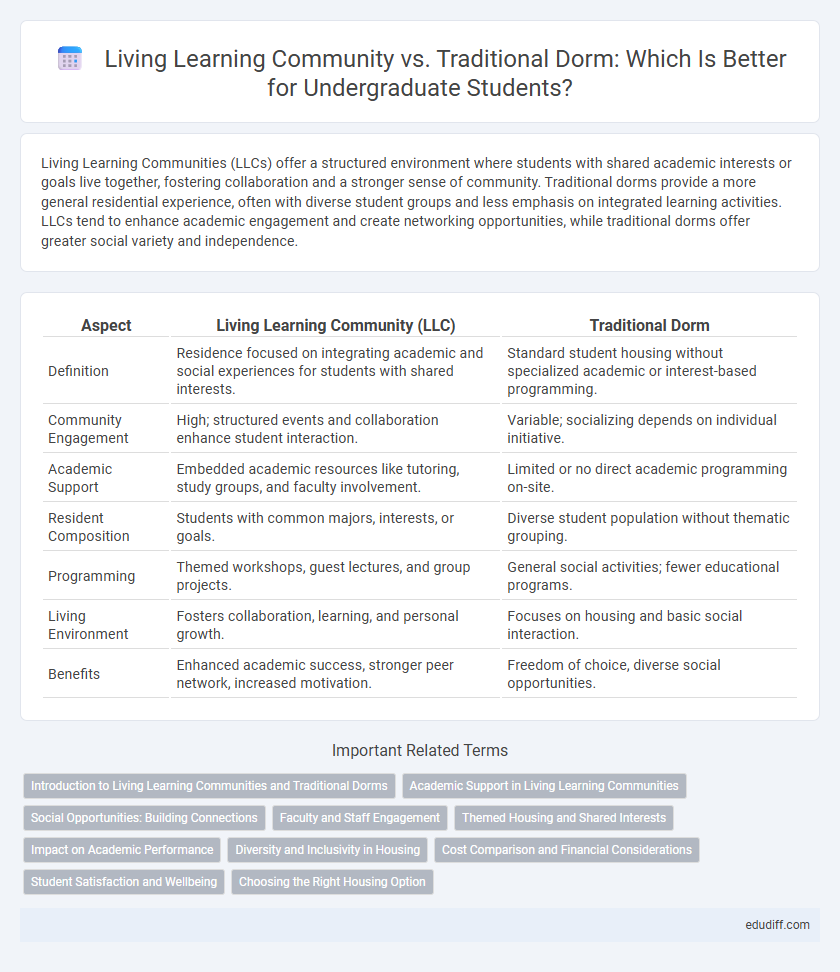Living Learning Communities (LLCs) offer a structured environment where students with shared academic interests or goals live together, fostering collaboration and a stronger sense of community. Traditional dorms provide a more general residential experience, often with diverse student groups and less emphasis on integrated learning activities. LLCs tend to enhance academic engagement and create networking opportunities, while traditional dorms offer greater social variety and independence.
Table of Comparison
| Aspect | Living Learning Community (LLC) | Traditional Dorm |
|---|---|---|
| Definition | Residence focused on integrating academic and social experiences for students with shared interests. | Standard student housing without specialized academic or interest-based programming. |
| Community Engagement | High; structured events and collaboration enhance student interaction. | Variable; socializing depends on individual initiative. |
| Academic Support | Embedded academic resources like tutoring, study groups, and faculty involvement. | Limited or no direct academic programming on-site. |
| Resident Composition | Students with common majors, interests, or goals. | Diverse student population without thematic grouping. |
| Programming | Themed workshops, guest lectures, and group projects. | General social activities; fewer educational programs. |
| Living Environment | Fosters collaboration, learning, and personal growth. | Focuses on housing and basic social interaction. |
| Benefits | Enhanced academic success, stronger peer network, increased motivation. | Freedom of choice, diverse social opportunities. |
Introduction to Living Learning Communities and Traditional Dorms
Living Learning Communities (LLCs) integrate academic and social experiences by grouping students with common interests or majors, fostering collaboration and deeper engagement in their field of study. Traditional dorms, in contrast, offer more general housing options with diverse student populations and fewer structured academic connections. LLCs typically provide specialized programming and faculty involvement, enhancing educational outcomes and community building beyond typical dormitory living.
Academic Support in Living Learning Communities
Living Learning Communities (LLCs) provide enhanced academic support through integrated faculty mentorship, peer study groups, and structured tutoring sessions, fostering a collaborative learning environment. Unlike traditional dorms, LLCs offer targeted resources aligned with students' academic interests and majors, promoting higher retention rates and improved GPA. This specialized support system in LLCs significantly contributes to students' academic success and deeper engagement with their coursework.
Social Opportunities: Building Connections
Living Learning Communities (LLCs) provide enhanced social opportunities by grouping students with shared academic interests, fostering deeper connections and collaboration. Traditional dorms offer diverse social interactions but often lack intentional community-building structures, leading to more superficial relationships. LLCs increase student engagement and sense of belonging through organized events and peer support networks.
Faculty and Staff Engagement
Faculty and staff engagement in Living Learning Communities (LLCs) significantly enhances undergraduate academic and social experiences by providing consistent access to mentors and advisors within the residence setting. Unlike traditional dormitories, LLCs foster structured programming and collaborative opportunities, promoting deeper faculty-student interactions that support student retention and success. This integrated approach cultivates an academic culture that bridges formal classroom learning with informal support networks.
Themed Housing and Shared Interests
Living Learning Communities (LLCs) create a unique environment where undergraduate students share themed housing based on academic interests or personal passions, fostering deeper connections and collaborative learning outside the classroom. Unlike traditional dorms that offer standard living arrangements, LLCs integrate programming and resources tailored to specific themes like sustainability, arts, or leadership, enhancing student engagement and retention. This shared-interest approach promotes a supportive community that encourages both social interaction and academic success.
Impact on Academic Performance
Living Learning Communities (LLCs) foster enhanced academic performance by integrating residential experiences with structured learning environments, leading to higher GPA averages compared to traditional dorm settings. Research shows students in LLCs benefit from increased peer collaboration, academic support, and engagement in faculty-led activities, contributing to improved knowledge retention and motivation. Conversely, traditional dorms often lack these targeted academic resources, resulting in less consistent academic outcomes.
Diversity and Inclusivity in Housing
Living Learning Communities (LLCs) foster greater diversity and inclusivity by intentionally grouping students with shared interests and backgrounds, creating supportive environments that promote cross-cultural understanding and collaboration. Traditional dorms often lack this targeted focus, resulting in less structured opportunities for meaningful interaction among diverse student populations. Research shows LLCs increase student engagement and satisfaction by cultivating inclusive social networks that enhance cultural awareness and equity on campus.
Cost Comparison and Financial Considerations
Living Learning Communities (LLCs) often have higher upfront costs compared to traditional dorms due to specialized programming and faculty involvement, influencing overall student expenses. Traditional dorms typically offer more affordable housing options with basic amenities, making them a budget-friendly choice for many undergraduates. Financial aid packages and scholarships can vary in coverage between LLCs and traditional dorms, impacting students' net housing costs significantly.
Student Satisfaction and Wellbeing
Living Learning Communities (LLCs) significantly enhance student satisfaction and wellbeing compared to traditional dormitories by fostering stronger social connections and academic support networks. Research indicates that students in LLCs report higher levels of engagement, lower stress, and improved mental health due to structured programming and shared interests. Traditional dorms, while providing basic accommodation, often lack these integrated support systems that contribute to holistic student development.
Choosing the Right Housing Option
Living Learning Communities (LLCs) offer undergraduate students immersive environments that integrate academic and social experiences, fostering collaborative learning and stronger peer connections. Traditional dorms provide more flexible living arrangements with greater independence but lack structured educational programming. Choosing the right housing option depends on individual priorities, such as desire for academic support, social engagement, and personal autonomy during college life.
Living Learning Community vs Traditional Dorm Infographic

 edudiff.com
edudiff.com